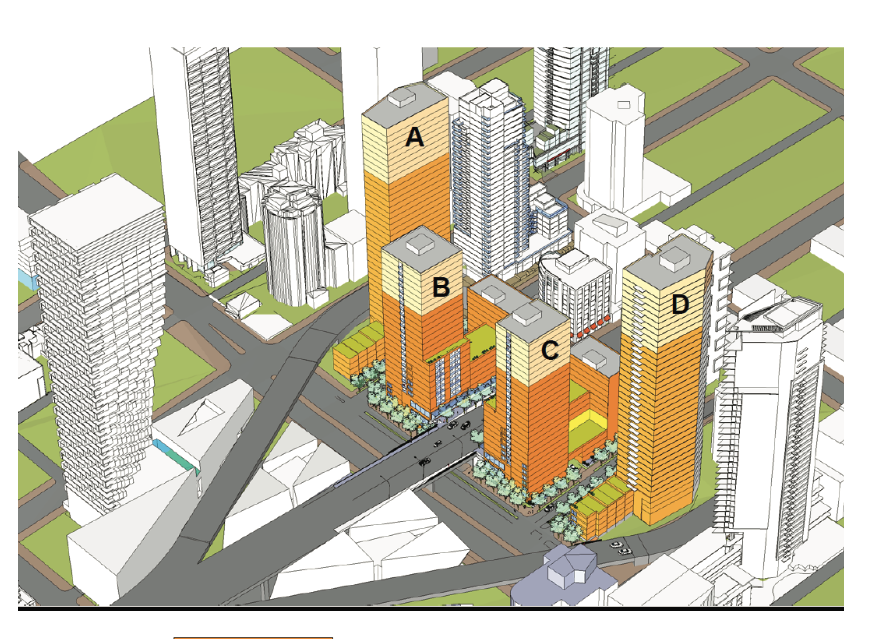Vancouver council voted 7-3 Tuesday (July 12) to rezone a large piece of city-owned land at the north end of the Granville Bridge that will allow the construction of six buildings, including two 40-storey strata towers.
The development will require the removal of two freeway-like circular ramps — known as the “Granville Loops” — and replaced by an H-shaped configuration of grade-level streets that connect to the bridge.
“It may not be perfect, but I think it's logical and it follows through on the commitments and policies that we have developed as a council,” said Coun. Adriane Carr in her closing comments.” That’s why I’m supporting this.”
The debate at city hall was focused on whether the city will eventually sell all or some of the land — which it has owned since the 1940s — or create long-term leases on the property.
Either way, the development is supposed to fund the $32 million price to remove the loops.
The majority of the development — at 606,329 sq. feet — will be strata-titled homes, with 166,389 sq. feet of social housing and 126,524 sq. feet of market rental. A 37-space childcare centre is also part of the plan.
Overall, 1,300 homes are anticipated to be developed over two 40-storey towers, two 27-storey highrises and two 21-storey buildings. Retail and plaza space are also incorporated in the design of the Pacific Street neighbourhood.
The social housing component is to replace 106 units lost when the Old Continental Hotel at the foot of the bridge was demolished. Tenants were moved to a former hotel on Kingsway.
'More strata condo is not what we need'
Coun. Sarah Kirby-Yung, who voted against the rezoning with councillors Melissa De Genova and Jean Swanson, said she was concerned about the number of condos anticipated on the property over more affordable housing.
“We know that with the affordability challenges that we have in the city, more strata condo is not what we need,” said Kirby-Yung, who suggested the $32 million price to remove the loops could be generated through other development proposals coming before council.
De Genova said she was worried that final designs of the buildings on the site and surrounding area would not go before council again, with a development permit board hearing the only mechanism for the public to voice concerns about the project.
“We have a template and an idea, but what's going to be finalized is out of our hands after we make this decision,” she said, noting the city earlier sold property at 601 Beach Cres. for $20 million that was developed for a 55-storey condo tower.
'Landowner questions'
City staff was asked several times during debate about the future of the property, and whether it would be sold — to which Theresa O’Donnell, the city’s planning director, replied that a future council will decide on that direction.
“The benefit of approving the rezoning tonight does allow the real estate department to go forward with some certainty about the entitlements so that they can probably attract a better party that's interested in acquiring the property — whether that's through direct sale or whether it's through a lease arrangement,” O’Donnell said.
“But a lot of those questions will be landowner questions that can be addressed either in council, in-camera or in the lease negotiations when and if the property does move forward.”
Council received several letters from residents about the proposal, including one from Joseph J. Haney, who noted the area was on his walking route to work.
“It's the last leg, and not a very pleasant part of it due to the bridge’s poor design,” Haney said. “Honestly, aside from the bridge itself needing an overhaul, these loops seem unnecessary and it would be a delight seeing them replaced with towers of mixed use and height.”
'Concrete jungle'
Vicki Bennett said she lives at the foot of Hornby Street and told council the neighbourhood doesn’t need six more buildings, including the 40-storey towers.
“It is becoming a concrete jungle instead of a livable city,” Bennett said. “We need more lowrises with gardens, relaxing areas and convenient services. If more housing is needed, consider more developments over a bigger area, but incorporate a variety of housing instead of blocks of highrises.”
Street infrastructure, she said, is already insufficient “without these monstrosities.”
“Not everyone is in a position to bike to services, social outings, family and jobs,” Bennett said. “Some of us have to drive to these things and we are already gridlocked due to a lack of streets accessible by cars, pedestrians, bike riders and insufficient advance turn lights.”
Carr was joined by councillors Michael Wiebe, Pete Fry, Christine Boyle, Lisa Dominato, Rebecca Bligh and Mayor Kennedy Stewart in supporting the rezoning. Coun. Colleen Hardwick was absent for the vote.
Two years ago, the current council approved the “Granville Connector” plan to make the bridge deck safer for pedestrians and cyclists.
As staff report at the time said the Granville Bridge represented “one of the biggest barriers” in the city’s pedestrian and cycling networks, with feedback from residents stating how uncomfortable and unsafe it is to travel.
@Howellings



